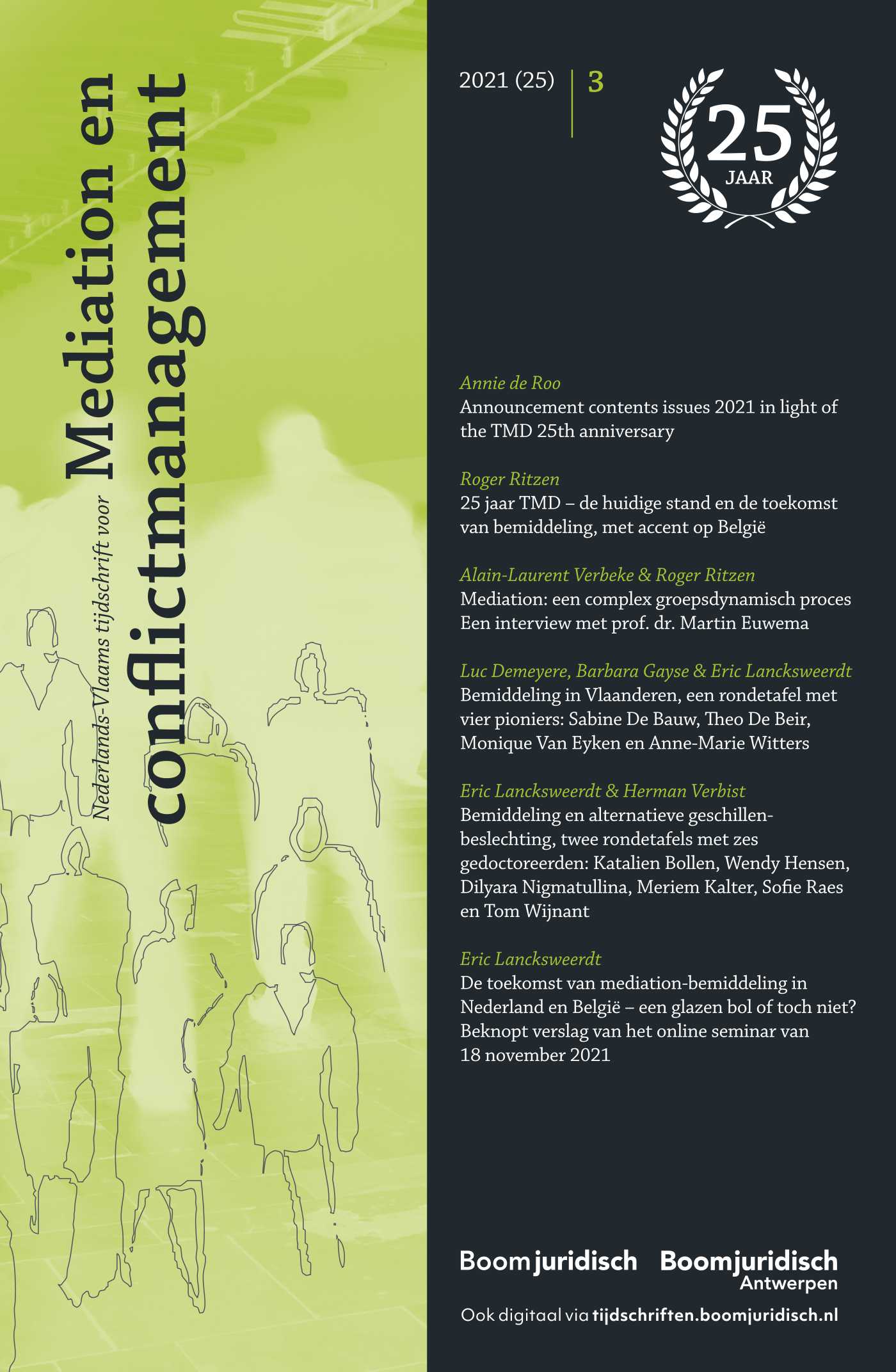|
The author discusses the details of the new Belgian statute on class actions. An intriguing part of the new legislation is that friendly negotiations between the disputing parties are strongly encouraged, yet the intervention of a professional mediator is wholly absent from the law. This is surprising, as the author emphasizes, in view of the procedural safeguards that mediation entails, safeguards that could also be of use in mass litigation. |


Nederlands-Vlaams tijdschrift voor mediation en conflictmanagement
Meer op het gebied van Mediation en herstelrecht
Over dit tijdschriftMeld u zich hier aan voor de attendering op dit tijdschrift zodat u direct een mail ontvangt als er een nieuw digitaal nummer is verschenen en u de artikelen online kunt lezen.
| Redactioneel |
Taal en rekenen, en de omgang met conflicten |
| Auteurs | Annie de Roo |
| Auteursinformatie |
| Artikel |
Bemiddeling bij Belgische class actions |
| Trefwoorden | massaschade, collectieve afwikkeling, consumentengeschillen, class action |
| Auteurs | Marc Taeymans |
| SamenvattingAuteursinformatie |
| Artikel |
De minnelijke beslechting van familiale geschillen in BelgiëNieuwe wegen als gevolg van de wet van 30 juli 2013 betreffende de invoering van een familie- en jeugdrechtbank |
| Trefwoorden | Familiale geschillen, Familie- en jeugdrechtbank, Minnelijke schikking, Akkoordvonnis, verzoening |
| Auteurs | Steven Brouwers |
| SamenvattingAuteursinformatie |
|
In a sequal to his earlier contribution in TMD 2014 (18) 2, p. 63, the author describes in more detail the ins and outs of the statute of 30 July 2013 on family and juvenile courts. With this new statute Belgian family and juvenile law are modernized. Also, the new statute started an autonomous development in family procedure, apart from the general civil procedure rules: most of the family conflicts can be solved in a shortened procedure and the possibility of mediation is introduced. |
| Artikel |
De maatschappelijke kosten van conflicten: een modelmatige benadering |
| Trefwoorden | Cost of conflicts, 12 billion euros |
| Auteurs | Ivor Brinkman |
| SamenvattingAuteursinformatie |
|
The cost of conflicts in the Netherlands between civil parties or individuals and the government add up to more than 12 billion Euro. For this calculation, a framework has been developed to distinct between three cost categories: Subject (parties) cost, System cost (e.g. court) and Consequential cost. The latter category represents more than 50% of the total cost, the majority of which are born by commercial parties and employer. The government bears 12,5% of the total cost. The impact on insurance companies could not be estimated but is suspected to be substantial. It are these three parties who in concert should fund further investigation and develop initiatives to reduce the financial and human cost of conflicts. It is to be investigated which incentives are required to make this game change to take place. |
| Artikel |
Geschillencommissies in het Nederlandse onderwijs en het gelijk van een goed gesprek |
| Trefwoorden | Onderwijs, Alternatieve geschillenbeslechting, Mediation, Nederland |
| Auteurs | Hilde Mertens |
| SamenvattingAuteursinformatie |
|
The Netherlands has a long history of alternative dispute resolution in the area of education. Recently, empirical research by ‘Onderwijsgeschillen’, the largest organization for dispute resolution in this field, has lead to the successful introduction of mediation in certain types of alternative conflict resolution. In this article, Hilde Mertens, managing director of Onderwijsgeschillen, describes this research, the practical implementation of its findings, and the positive impact of mediation in conflict resolution in education. |
| Boekbespreking |
Verzekering en ADR |
| Auteurs | Peter van Schelven |
| Auteursinformatie |
| Casus |
The path from 'calculating the cost of conflicts' towards 'cooperation controlling' |
| Trefwoorden | Conflict Management, Cooperation Controlling, Mediation Paradox, Cost of Conflict |
| Auteurs | Elvira Hauska en Berndt Exenberger |
| SamenvattingAuteursinformatie |
|
In this contribution the author(s) contend that controlling cooperation is a better appraoch to succesfully meet the mediation paradox (discussed a.o. by De Palo et al. in the European Parliament Rebooting study) and the conflict management paradox, than merely calculating the costs of conflicts. The author(s) discuss the phenomenon of denial gap, and summarize some of the results they achieved with their team spirit barometer in surveys among Austrian managers during the past few years. |
| Casus |
Verslag internationale conferentie: Mediation, Communicatie en DialoogVerbreding en verdieping van het gebruik van het transformatieve mediation model |
| Auteurs | Lida M. van den Broek |
| Auteursinformatie |
